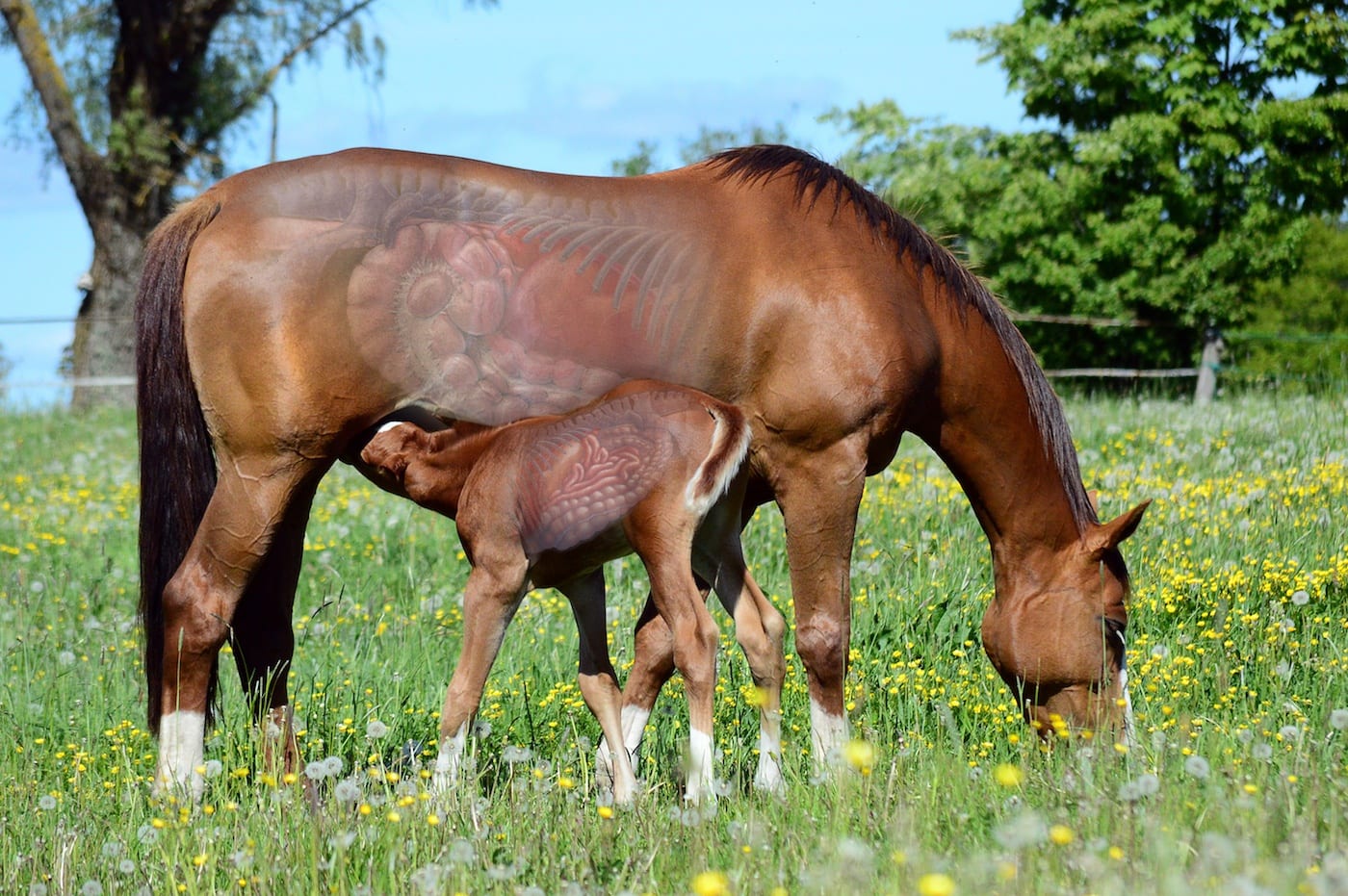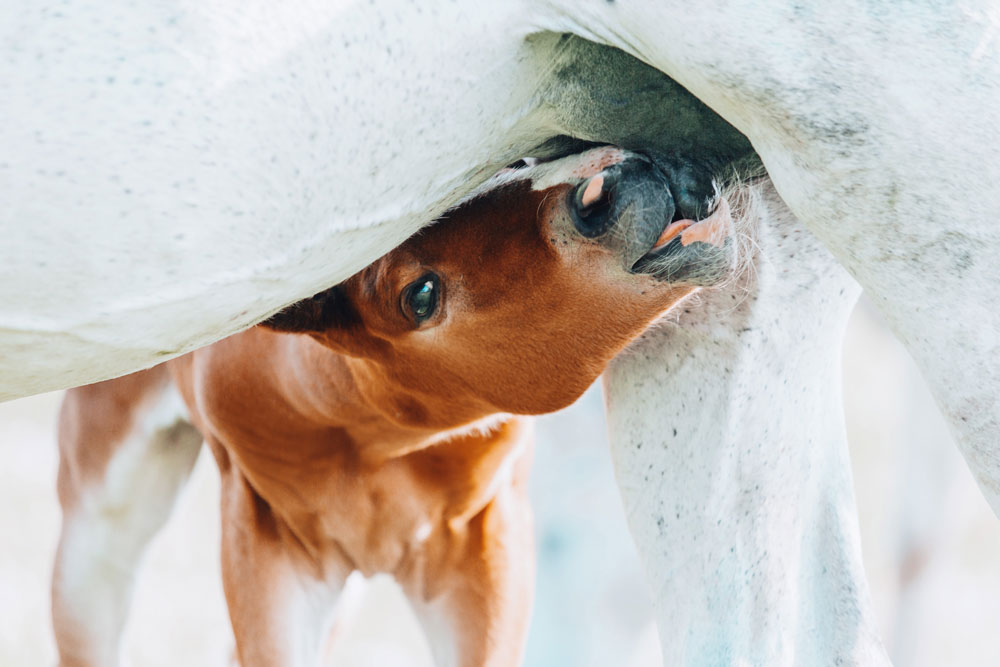Digestive health is one of the most important components of whole horse wellness and performance. The digestive system directly affects many other systems in the horse’s body. But this aspect of equine health is also the most susceptible to disruption from modern management practices.
The health and function of the equine digestive tract impact fertility, body condition, immunity, cognition, hoof health, energy, and more. So you shouldn’t treat gi tract health as a small, separate part of horse management.
Gastrointestinal issues can have adverse effects throughout your horse’s body, and a healthy digestive system can help reduce the risk of other health problems. Keep reading to discover how ongoing gi tract health management can promote optimal nutrition, performance, and behavior in your horse.
The Connections Between Digestion and Other Body Systems
Every part of your horse’s body relies on nutrients absorbed in the gastrointestinal tract. If nutrient absorption is hindered by poor digestive function, these systems don’t get the nutrients they need to keep your horse healthy. Additionally, the digestive tract plays a major role in immunity and other pathways throughout the body.
Fertility
Stallions and mares need specific nutrients from their diets for reproductive processes. However, research shows that breeding demands can predispose these horses to digestive problems that reduce nutrient absorption. (Mantovani, 2011)
Even if breeding horses eat balanced diets to support fertility, poor gi tract health can prevent them from getting these essential nutrients. Therefore, providing nutritional support to promote optimal digestive function can help support fertility during breeding season.
Weight/Body Condition
Some of the impacts of digestion on fertility result from the effects of body condition on overall health. However, a healthy weight is essential for all horses, not just breeding mares and stallions.
Your horse’s weight is a direct reflection of how well he gets the energy he needs from his diet. A poor body condition despite maintaining a balanced diet can indicate underlying digestive problems, while a healthy body condition is a standard external marker of good gi tract health.
Immunity
The equine digestive system is closely connected to immune function. About 80% of the equine immune system interacts with the gastrointestinal tract. (Dicks, 2014) This interaction helps protect the horse from harmful microbes ingested with feed matter.
The gut microbiota also plays an important protective role by competing with these pathogens. However, disruptions to populations of beneficial intestinal bacteria can compromise this protection, so supporting hindgi tract health is critical for promoting a robust immune system.
Brain/Cognition
Recent research on the gut-brain-microbiota axis in horses has revealed that gi tract health can significantly impact their behavior. The vagus nerve directly connects the brain and the GI tract, and microbial disruptions in the gut can trigger disruptive signals in the nervous system. (Destrez, 2019)
Stress hormones influence both the digestive system and the brain. Therefore, supporting gi tract health can help promote a balanced brain in performance horses subject to increased stress.
Hooves
Strong hooves and a healthy digestive tract are vital for equine health and performance. These structures are also deeply interconnected, and hoof quality can be another external indicator of your horse’s digestive health.
The horse’s hoof relies on essential amino acids, vitamins, and minerals for continual growth and structural integrity. Poor digestive function can prevent the optimal absorption of these nutrients and compromise hoof quality. So a balanced microbiome and healthy gut are essential for maintaining strong feet. (Burns, 2021)
Energy/Metabolism
Some feeding practices designed to support energy levels in athletic horses can have the opposite results due to the adverse effects of high-starch grains on equine gi tract health.
Nutritional management for performance horses should prioritize maintaining a healthy digestive system to ensure these horses can absorb the energy they need from their diets. Horses get most of their dietary energy from fiber digested by beneficial hindgut microbes, so a balanced microbiota is essential for supporting energy levels. (Richardson, 2016)
Other
Other aspects of equine health connected to the gut include:
- Strength
- Attitude
- Recovery
- Haircoat
- Focus
- Appetite
- Movement
- Rideability
- Resistance
- Comfort
How Ongoing Gut Health Management Supports Entire Body
Ongoing gi tract health management has benefits that extend beyond the gastrointestinal tract. Nutritional support that addresses the entire digestive tract also affects your horse’s whole body by promoting optimal nutrition, performance, and behavior.
Digestion Affects Nutrition
Your horse needs a balanced diet that provides all the necessary nutrients to support the optimal function of every bodily system. In addition, healthy digestion promotes a good appetite, encouraging horses to eat adequate amounts of forage and feed to meet their nutritional requirements.
Proper digestive function is also critical for horses to utilize feed and absorb the nutrients their diet provides. Horses simply can’t benefit from good nutrition without good gi tract health.
Digestion Affects Performance
Nutrient deficiencies caused by poor gi tract health can also lead to poor performance. When horses don’t get the nutrients needed to support energy, agility, and strength, they can’t perform at their best.
A healthy and well-nourished horse stands out in the show arena, but digestive imbalances can take your horse’s attention off of his job. A balanced gut promotes a balanced body, and as a result, peak performance is only possible with a healthy gut.
Digestion Affects Behavior
Discomfort from poor digestive health can contribute to behavioral problems that hinder performance and make horses challenging to handle. After all, your horses can only focus on what you ask of them when they’re comfortable.
As a result, maintaining gi tract health is critical for supporting desirable behaviors in horses and ensuring they stay comfortable on the road and in the ring.
SUCCEED for Ongoing Nutritional Support
Ongoing digestive support from SUCCEED Digestive Conditioning Program can help promote overall horse health and performance. This nutritional supplement provides ingredients that promote the health of the entire equine GI tract, which in turn supports the health of your horse’s whole body.
- Oat Oil: Polar lipids from oat oil promote normal digestive function by supporting intestinal integrity and nutrient absorption.
- Oat Flour: Oat flour is rich in beta-glucan, which helps slow feed movement through the GI tract and moderate the release of sugars.
- Yeast Products: Mannan oligosaccharides and nucleotides from yeast products encourage the growth of beneficial intestinal microflora and inhibit the growth of pathogenic bacteria.
- Amino Acids: L-glutamine and l-threonine fuel immune cells in the intestinal mucosa and support the regeneration of the gut wall.
Take the SUCCEED Challenge risk-free to see the whole-body changes a new gut protocol can make in your horse.
References
- Mantovani, R. et al. Energy and protein allowances and requirements in stallions during the breeding season, comparing different nutritional systems. J Anim Sci. 2011.
- Dicks, L. et al. The equine gastro-intestinal tract: An overview of the microbiota, disease and treatment. Livest Sci. 2014.
- Destrez, A. et al. Dietary-induced modulation of the hindgut microbiota is related to behavioral responses during stressful events in horses. Physiol & Behav. 2019.
- Burns, T. “Feeding the Foot” Nutritional Influences on Equine Hoof Health. Vet Clin Equine Pract. 2021.
- Richardson, K. et al. Fiber for Performance Horses: A Review. J Equine Vet Sci. 2016.




